of graduate employers say relevant experience is essential to getting a job with them
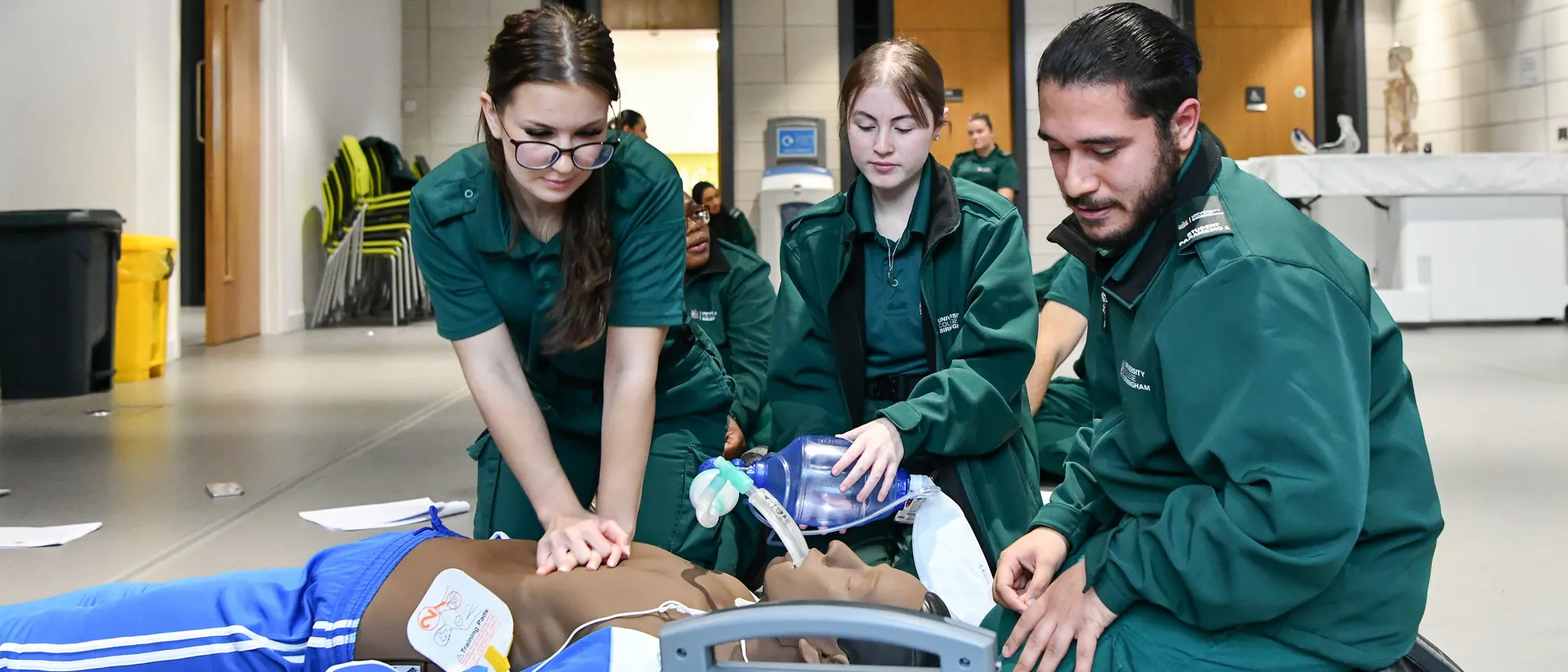
PARAMEDIC SCIENCE WITH FOUNDATION YEAR
BSc (Hons)
Accredited by University College Birmingham
- University
- Undergraduate
- Courses
- Paramedic Science with Foundation Year BSc (Hons)
Award
BSc (Hons)
Duration
4 years full-time
Placement
Approx. 600 clinical hours per academic year
Entry
September
Fees
View fees

Paramedicine is a rapidly expanding field in the UK due to the aging population and changing healthcare needs

You could receive a £5,000 non-repayable grant and up to £1,000 to support childcare costs
On our innovative Paramedic Science with foundation year degree, you will learn the underpinning paramedic knowledge, skills, values and behaviours fundamental to professional paramedic practice. Crucially, it gives graduates eligibility to apply for registration as a paramedic with the Health and Care Professions Council (HCPC) and enter the workforce as a registered Allied Health Professional.
UK Paramedics have diverse roles, including responding to emergency calls, providing pre-hospital care and performing medical procedures such as administering medications, intubation and defibrillation. And not all qualified paramedics wear green. They work in many other areas of healthcare, including primary care in general practice and out in the community, as well as in education.
With training in our cutting-edge simulation facilities, the course will enable you to deliver safe and proficient paramedic care across diverse settings. Through immersive and simulation-driven learning, you will actively engage in your educational journey, while the course's pedagogical approach facilitates the practical application of theoretical concepts to solidify your comprehension of paramedic science.
In addition to medical expertise, you will gain advanced abilities in communication, teamwork, clinical decision making and the factors that impact healthcare, while our curriculum explores paramedic care methodologies from around the world. The course is also seeking accreditation by the College of Paramedics.
£5k Cost of Living Allowance: for all full-time UK undergraduate students joining us in 2026.
Why should I choose this course?
- FOUNDATION YEAR - From level 3 you will explore how to develop essential academic and learning skills, and develop a sense of belonging through teamwork and collaboration. You will identify and practice essential learning and educational skills, enhancing your ability to succeed in higher education.
- PRACTICE PLACEMENTS – Gain practical experience on multiple placements with ambulance services and clinical practice areas and in community settings
- PRACTICAL APPLICATION – Perfect your practical skills on campus in our Health Skills and Simulation Suite, with state-of-the-art simulation facilities including a replica hospital ward. Students will also have access to a simbulance - a fully functioning ambulance capable of recording various training scenarios
- MULTI-DISCIPLINARY APPROACH – Access to the University's prosthetics team and their skills in replicating injuries for a realistic approach to patient care
- AWARD-WINNING UNIVERSITY – Study at the highest-ranking university in the region according to student choice (Whatuni Student Choice Awards 2023)

Benefits of a Foundation Year
This course has lower entry requirements and provides an accessible entry route to completing your undergraduate degree. With personalised support and a focus on individual development, the foundation year of this course is designed to strengthen your knowledge, skills and confidence.
- DIRECT PROGRESSION - Progress straight into Year 1 of your undergraduate degree in your chosen field after your foundation year is complete
- Personal Growth – Boost resilience, self-belief and organisation with personalised support from your tutors
- A sense of Belonging – Become part of a supportive learning community and ease into university life with confidence
- BUILD YOUR ACADEMIC SKILLS - Build your skills and knowledge in your chosen area before starting your undergraduate degree
Our facilities
As a student on our paramedic course, you will have access to our university healthcare team, including our Health Skills and Simulation Suite. This includes a purpose-built six-bed hospital ward to help you practise your clinical paramedic skills and enhance your practical training. We are committed to creating ‘real-life’ in situ paramedic experiences and have access to a simbulance and other specific ambulance simulation equipment for you to apply your knowledge and practise your clinical skills in a safe learning environment.
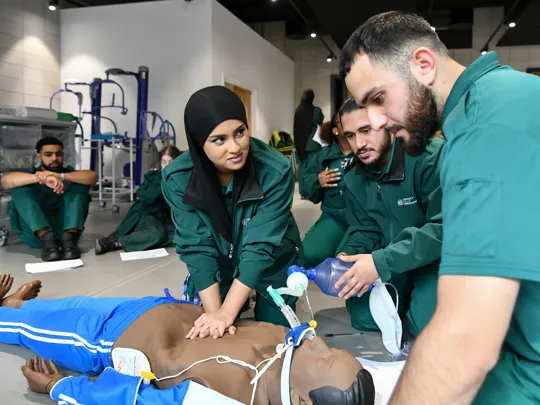
You will have access to our university healthcare team, including our Health Skills and Simulation Suite
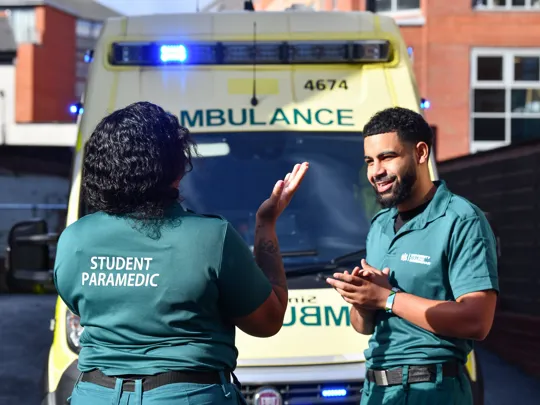
We are committed to creating ‘real-life’ in situ paramedic experiences and have access to a simbulance
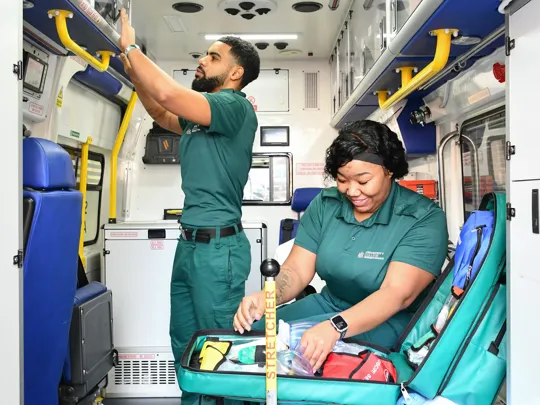
A range of specific ambulance simulation equipment for you to apply your knowledge and practise your clinical skills in a safe learning environment
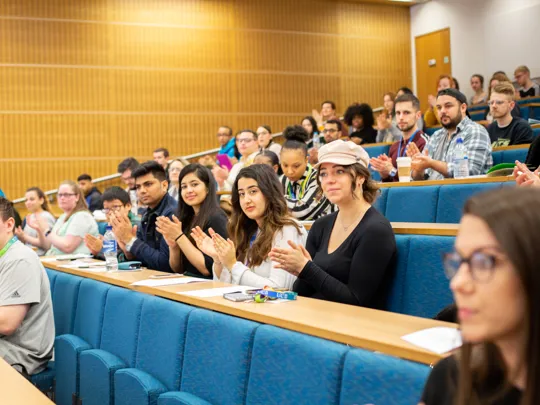
Our campus buildings feature lecture theatres equipped with the latest technology, as well as comfortable tutorial and seminar rooms and private meeting rooms
Course breakdown
- Foundation Year
- Year 1
- Year 2
- Year 3
Core modules
Applied Science and Human Biology for Health
This module introduces you to the essential scientific principles underpinning human health and healthcare practice. Through an inclusive and applied approach, learners will explore the structure and function of the human body, common disease processes, and the scientific foundations relevant to modern healthcare settings. You’ll gain a practical understanding of anatomy and physiology, microbiology, pathology, and the basic chemistry and physics that influence health and wellbeing. The module also highlights genetic conditions that disproportionately affect certain cultural groups—such as sickle cell anaemia and type 2 diabetes—supporting your awareness of population health and culturally responsive care. Whether you’re new to science or returning to study, this module is designed to build your confidence, scientific literacy, and readiness for degree-level healthcare education.
Academic and Study Skills for Healthcare
This module is designed to support students in developing the academic and study skills necessary for success in healthcare-related degrees. Focusing on bridging the gap between foundational knowledge and degree-level study, it provides comprehensive support in key areas such as academic English, scientific writing, numeracy, and critical thinking. Students will build confidence in public speaking and self-advocacy while developing essential strategies to overcome systemic barriers in education. This module emphasizes the importance of academic integrity and equips students with the skills to effectively engage with healthcare data, research, and real-world problem-solving. Through interactive sessions, students will also learn how to navigate numeracy in health for example being able to measure and record vital signs, developing practical experience to support their academic work. Building resilience and the ability to reflect on challenges is a key component of this module, enabling students to navigate setbacks and continue to grow throughout their academic journey.
Health & Wellbeing; Culturally Responsive Healthcare
This module equips you with the knowledge and skills to understand and address the health needs of diverse communities. Focusing on the principles of public health and health promotion, the module explores the social, economic, and environmental factors that influence health outcomes, with particular attention to the public health issues disproportionately affecting ethnic minorities. Key topics include mental health awareness, resilience building, and strategies to reduce stigma around mental health in both society and minoritised communities. You will also explore cultural perspectives on health and illness, examining how different cultural frameworks shape attitudes toward health and healthcare. The module encourages critical thinking and reflection on how to deliver healthcare that is inclusive, equitable, and culturally responsive. By the end of the module, students will be aware of public health strategies, understand principles of mental health resilience, and what contributes to health disparities, all while considering the cultural nuances that influence healthcare access and outcomes.
Introduction to Healthcare Professions
This module introduces students to the diverse and dynamic world of healthcare professions, with a strong focus on inclusivity, equity, and effective communication. Whether you're considering a career in nursing, physiotherapy, paramedic studies, radiography, or another allied health role, this module will give you the knowledge, confidence, and practical tools to succeed in a modern healthcare environment. You’ll explore what it means to be a healthcare professional—learning about key roles and responsibilities, ethical and legal frameworks, and the importance of working within multi-disciplinary teams. Throughout the module, we’ll shine a spotlight on diverse role models and underrepresented voices in healthcare, helping you see where you fit and how you can make an impact.
Core modules
Fundamental Skills in Paramedic Practice
This module is designed to equip aspiring paramedics with the essential clinical skills and hands-on expertise necessary for success in the field. Through a carefully crafted curriculum, you'll navigate various medical scenarios, refining your decision-making abilities and enhancing your capacity to provide effective pre-hospital care. You will engage in realistic clinical simulations, enabling you to refine your diagnostic and intervention skills under the guidance of experienced instructors.
Introduction to Anatomy and Physiology for the Paramedic
In this module you will explore anatomy and physiology, developing a comprehensive knowledge of the organ structures and functions of the human body. From the basic building blocks of cells to the complexities of systems, this module will provide you with the knowledge essential for Paramedic Science.
Introduction to Professional Practice: Leading Self
This module will support you to becoming a skilled Paramedic professional. It will develop your communication and professionalism skills, enabling your growth as a practitioner. The module will discuss theories and processes related to communication, self-awareness, and engage in discussions about law and ethics. You will gain insight into the responsibilities of a registered practitioner, understanding the expectations set by the college of Paramedics and the HCPC.
Paramedic as the Reflective Practitioner
This module focuses on developing reflective practice skills essential for paramedics. Students will learn techniques for reflecting on their experiences, analysing clinical decisions, and identifying areas for professional growth. Through case studies, journaling, and discussions, participants will enhance their ability to provide high-quality, patient-centred care by continuously evaluating their knowledge, skills, and attitudes. The module emphasises the importance of lifelong learning and adapting to the evolving nature of paramedic practice through critical self-reflection.
Social Determinants of Health for Paramedics
Throughout this module students will develop the paramedic knowledge, skills values and behaviour in line with the college of paramedic's spiral curriculum and the HCPC Standards of Proficiency for Paramedics.
Core modules
Developing Paramedic Skills: Leading Others
Students will explore Clinical Skills at Level 5 in Paramedic Science enabling the development of advanced clinical techniques, tackling complex medical and trauma emergencies. Students will engage in interprofessional collaboration, refine their communication skills within a range of situations. Through immersive simulations and reflective practice students will bridge theory to real-world scenarios, preparing for autonomous paramedic practice. This module instils professionalism, ethical conduct, and evidence-based practices, propelling students toward leadership roles in the ever-evolving realm of paramedic science.
Ethical and Clinical Decision making in Paramedic Practice
This Level 5 module enhances students' clinical judgement and ethical decision-making across diverse healthcare challenges. Through analysis of complex medical emergencies and vulnerable populations, students refine their reasoning abilities to make sound judgements under pressure. The curriculum emphasises paramedic regulation, healthcare law, end-of-life care, mental health crises, and community integration issues to equip students with a comprehensive understanding of the multidimensional role of modern paramedics. This module ensures students can apply robust ethical, legal and professional reasoning alongside complex clinical skills for contemporary paramedic practice.
Evidence-informed Practitioner
This module will empower students to develop their comprehension of research methodology and methods. This module gives students the opportunity to hone the skills necessary for grasping research methodology and methods. This knowledge can subsequently be applied in the context of the Level 6 Dissertation, these approaches can be applied across various educational and employment scenarios.
Health Across the Life Course for Paramedics
This module aims to enrich students' learning by extending the knowledge of health across the life course. It will explore comprehensive aspects of anatomy and physiology across the life course, including maternity and trauma injuries. These experiences will complement other modules, providing opportunities to apply theoretical knowledge in practical settings.
Pharmacology and Pharmacokinetics
Paramedics serve as versatile practitioners, addressing a wide spectrum of patients in varied and dynamic settings. This module aims to encompass the crucial pathophysiology and pharmacology related to typical emergency scenarios, whilst fostering the foundational skills necessary for providing secure and efficient care.
Core modules
Advanced Skills in Paramedic Science
This module develops the assessment and management of minor injuries and illnesses across all ages within paramedic practice. Students will enhance their underpinning knowledge and clinical decision-making abilities to provide competent care at the advanced paramedic level. Key learning outcomes include performing holistic assessments, implementing appropriate management plans, and exercising increased clinical judgment for patients presenting with minor conditions. On completion, students will have the confidence and competence to effectively evaluate and treat minor injuries and ailments in the out-of-hospital environment.
Paramedic Science within an Ageing Population
The ageing population presents numerous challenges for Paramedic Science and this module will support the development of knowledge and skills within the non-emergency healthcare context. This module will focus on the compassionate care of a diverse multicultural ageing population.
Research for Health and Care Professionals
This module will develop independent learning and enquiry, problem-solving, analysis and data presentation skills. You will deepen your knowledge in a selected area of your choice and related to your field of practice. This may be a review of a health or social care service, audit or an empirical piece of research.
Transition to Professional Practice: Leading Change
This module will enable you to reflect upon your personal and professional growth throughout your degree; drawing on evidence of learning and development gained during the programme. It will enable you to develop and apply leadership, management and inter-professional team working concepts, required for effective pre-hospital care and positive patient outcomes. Thus, supporting your effective transition to becoming a registered Paramedic and autonomous clinician.
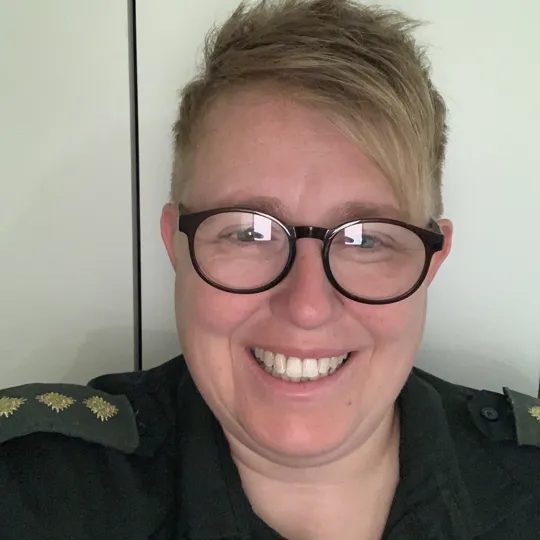
"In a world where compassion and skillful intervention can be the difference between life and death, choosing to study to be a paramedic is an incredible journey towards a purposeful, meaningful and inspirational career. It's an opportunity to make a real difference in the lives of those who need it most."
Claire McCullagh Paramedic Science Course Lead and Senior Lecturer
Entry requirements
Entry requirements
48 UCAS points or equivalent.
GCSE/IGCSE: Maths and English grades 9-4 (grade A*- C) or equivalent.
The course is designed to meet all the necessary requirements of the Health and Care Professions Council (HCPC) in relation to the standards of proficiency, so that students are eligible to apply for registration as a paramedic and to use the protected title of paramedic.
If you have any questions about applying to University College Birmingham for this course, please complete our enquiry form here.
Disclosure and Barring Service (DBS)
Students must also complete an Enhanced Disclosure and Barring Service (DBS) check. The University will coordinate and fund the completion of the DBS check. Further information is available regarding the DBS check – the requirements prior to entry onto the course can be found here and a summary of the documents required for the application process can be found here.
Pre-course health and immunisation requirements
Students must complete a Pre-course Health Questionnaire and meet the Immunisation Requirements.
In addition to the above, we would also strongly recommend that applicants receive the latest vaccinations against Covid-19 and influenza, though this is not compulsory for entry.
Interview
Upon successful completion of the foundation year, students will be guaranteed an interview for the degree programme, where the Paramedic Science admissions team will assess their suitability for the course.
Key information
Teaching and assessment
Note: Indicative information only – actual timetables and assessment regimes will be issued at your induction.
A typical teaching week for this full-time course (approximately 12 hours) will include a range of teaching and learning strategies designed to enhance your academic journey and may include:
- Practical skills and simulation sessions
- Placement learning opportunities
- E-learning
- Small group teaching and discussion groups
- Seminars and lectures
- Self-directed study
You will also need to commit around 20 hours per week for individual study time.
Assessment
You will be assessed in a variety of ways. Assessments may include objective structured clinical examinations (OSCEs), coursework and written examinations.
Our teaching and assessment is underpinned by our Learning and Teaching Strategy 2025-2030.
Timetable
Whilst your lessons will be timetabled into 2-3 days a week, it is worth noting that your course includes regular placements in addition to these hours.
Tuition fees for home students
If you are a home student enrolling on a bachelor's or foundation degree course at University College Birmingham, the 2025/2026 academic year tuition fee for full-time study is £9,535. For part-time study, the fee is £4,767.50.
Funding for paramedic students
On top of £5,000 free Cost of Living Allowance you get from us, additional support from the UK government is available to paramedic science students, which includes a non-repayable payment of £5,000 to eligible students each academic year, and additional payments worth up to a total of £3,000 to help students cover childcare costs. Find out more.
Tuition fees for international students
If you are an international student (or have been fee assessed as an international fee payer) and are enrolling on a full-time [Band 1] bachelor's degree course in 2025/2026, the fee for the academic year will be £16,000. If you complete a placement year, there will be an administration fee of £500 for a full year or £250 for a half-year placement.
Uniform and kit costs
This course requires a uniform and a laptop. A uniform will be provided for full-time students. Additional resources can also be redeemed through the Kick-Start Scheme (UK students only, eligibility criteria applies), including stethoscopes, safety boots and kit bags.
Kick-Start Scheme
As a new student studying this course full-time, you will receive £300 per year through our Kick-Start Scheme (UK students only, eligibility criteria applies). This scheme will support your studies and future career by contributing to course-related materials, uniform or selected items on campus. You may also qualify for an additional £500 per year.
Find out more about the Kick-Start Scheme here.
Work placements
Practice placements are vital for gaining real-life experience and for building your confidence and skills before you finish your course – and they may even lead to a job when you graduate. Our Hired team can help find the ideal placement for you.
Our BSc Paramedic Science course features multiple practice placements with our practice partners in different environments throughout your studies. Over the three years, you will need to complete 1,800 clinical practice hours on placement.
Work alongside experts in your sector
A snapshot of some of the employers we have worked with:
- Elite EMS ambulance service
- University Hospitals Birmingham NHS Foundation Trust
- Birmingham Women's and Children's NHS Foundation Trust
- Sandwell and West Birmingham NHS Trust
- Birmingham Community Healthcare NHS Foundation Trust
- Birmingham and Solihull NHS Training Hub
- The Royal Orthopaedic Hospital NHS Foundation Trust
Career opportunities
Note: Some roles below may require further study/training. The roles and salaries below are intended as a guide only.
Paramedic
Average Salary: £25,794
Advanced clinical practitioner
Average Salary: £50,173
Critical care paramedic
Average Salary: £35,543
Custody paramedic
Average Salary: £37,000
Prescribing paramedic
Average Salary: £55,000
Paramedic educator
Average Salary: £42,500
Want to take your studies to the next level? Completing the BSc (Hons) degree will enable you to move onto our postgraduate courses.

Taylor's Story
Taylor wanted to be a paramedic from an early age which is why he chose the Paramedic Science degree. His future goal is to work for the Helicopter Emergency Medical Service.
Other courses you may like
Mental Health Nursing BSc (Hons)
Start your journey towards a rewarding career in mental health nursing. We are an award-winning provider of nursing education and our NMC-accredited course will prepare you for entering this sector through extensive placements and practical training, enabling you to apply for Registered Nurse (Mental Health) status on completion.
Physiotherapy BSc (Hons)
Kick-start a career as a physiotherapist by studying our Physiotherapy degree. This course will give you advanced training to diagnose and rehabilitate across a range of conditions, aiding recovery from surgery, accidents, strokes or sports injuries and supporting people with disabilities.
Health and Social Care BSc (Hons)
Discover how you can make a difference to the lives of many different people in their time of greatest need. This course will prepare you for working in the dynamic health and social care sector, with weekly placement experience and additional qualifications available.
